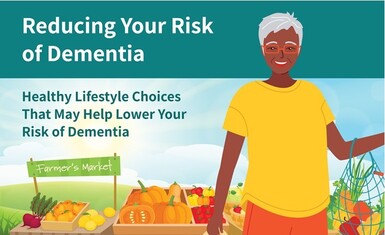 Many factors may influence your risk of dementia, including genes, environment, and lifestyle. You can’t change some factors, but, as with many diseases, there may be steps you can take to help lower your risk. Learn more about how leading a healthy lifestyle is important for your health. To learn more, click the button below.
0 Comments
If you don’t see an aging parent or friend often, changes in their memory and function may seem dramatic. In contrast, a primary caregiver like a spouse might not notice such changes or realize that more help, medical treatment, or supervision is needed. Talk with your loved one and the primary caregiver about your concerns. Consider these conversation tips:
The room transformed as an older woman danced around the skilled nursing care unit to rock ’n’ roll hits from her youth. Her husband later took her hands and joined her in a two-step tour of the space. First-year Penn State College of Medicine medical student John Bufalini watched in awe as the couple’s joy filled the room at the assisted living facility.
Researchers at Weill Cornell Medicine are conducting a research study examining well-being and resource use in dementia caregivers. The aim of this study is to identify and examine the needs of caregivers and the types of resources and support services that would be most beneficial to promote well-being in caregivers. If you are eligible and agree to participate, you will be asked to complete an online survey lasting 20-30 minutes. Then, you will be given the option to participate in a follow-up phone interview with a member of our research staff. You will be asked to answer some questions about your demographic characteristics, care responsibilities, challenges experienced, and ways you have coped with those challenges. Then, you’ll be asked to answer some questions about your use of community resources, barriers to accessing and using resources, and suggestions for resources that you would be interested in using in the future based on your own personal needs. You will receive a stipend of $25 for your completed surveys. For those who choose to participate in the open-ended interview, you will be compensated with another $40. If you have any questions about this survey, please feel free to email Francesca Falzarano [email protected] or call (646)481-2858. To view the flyer for this study, click the button below.  Brain donation helps researchers study brain disorders, such as Alzheimer’s disease and related dementias, leading to improved treatments for future generations. While many people think that signing up to be an organ donor includes donating their brain, the purpose and the process of brain donation are different. Rather than helping to keep others alive, such as with kidney donation, brain donation helps advance scientific research. One donated brain can make a huge impact, potentially providing information for hundreds of research studies. Click below to learn more about how you could be the brain behind the breakthrough. One of the defining moments of Karen Bond’s professional career came about five years ago. “For years, I had worked really hard to become president of Executive Alliance,” she said of the nonprofit dedicated to helping professional women succeed in leadership roles.
At the time, Bond was taking care of her mother who had dementia along with being a mother to her daughter and having a thriving professional career. “The day of our Women of Excellence luncheon, that I had always dreamed that my mother would be able to be there and see that achievement, was the day that my caregiver didn’t show up and I was scheduled to be in front of a thousand women. I barely got there in time.” Caregiving can be extremely challenging for professional women as many must juggle their careers with motherhood and with their elderly parents/relatives. While home health care aides can help, a majority of women take on the caregiving responsibility themselves. From: The Daily Record (Maryland) Regular exercise, respite breaks and connecting with others will help you in this challenging role.
“Since my mom was recently diagnosed with dementia, I’ve been confused about what to do,” said the 50-year-old woman at a neighborhood barbecue, balancing a paper plate with a hot dog and potato salad. “Different people give me advice about helping her and making sure I’m all right, but that advice isn’t always the same. I feel like I have to figure this out on my own.” Her confusion distressed me. There are millions of Americans in her position and tens of millions more who’ve gone through caregiving in the past. No one starting out as a caregiver, in my opinion, should have to reinvent the wheel. Yet when a parent or spouse is revealed to need care, most people feel lost about what to do. My neighbor wasn’t exactly looking for me to give her more advice — it sounded like she’d had her fill already — but was hoping for a hint at least about where to start. Click the link below to continue reading the entire article by AARP's Barry Jacobs. |
Caregiver
Whether in a medical professional setting or personal homes, Caregivers are caring and caring takes energy, wisdom and compassion. This Caregiver Blog is here to give you insight, encouragement and tools, not just to give care but to survive and thrive while doing it. Archives
July 2023
Categories
All
|
 RSS Feed
RSS Feed
